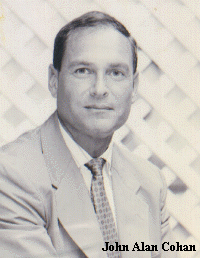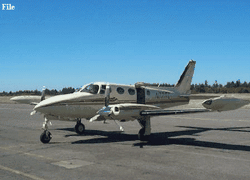By John Alan Cohan, Attorney at Law
 Aviation accidents often result in injury or death
during takeoff before the plane even lifts off. In a recent
incident, a Cessna 340A vaulted an embankment and came to rest on
an airport service road during an aborted takeoff at Santa Monica
Municipal Airport, California. The private pilot and one passenger
were fatally injured, and the airplane was destroyed by impact and
fire. The National Transportation Safety Board preliminary report
said that the airplane’s flight control lock was found with
the pin engaged through the mating hole of the pilot’s
control column. Apparently, the pilot had failed to remove the pin
before takeoff was attempted.
Aviation accidents often result in injury or death
during takeoff before the plane even lifts off. In a recent
incident, a Cessna 340A vaulted an embankment and came to rest on
an airport service road during an aborted takeoff at Santa Monica
Municipal Airport, California. The private pilot and one passenger
were fatally injured, and the airplane was destroyed by impact and
fire. The National Transportation Safety Board preliminary report
said that the airplane’s flight control lock was found with
the pin engaged through the mating hole of the pilot’s
control column. Apparently, the pilot had failed to remove the pin
before takeoff was attempted.
The pin is designed to protect flight controls when the plane is
inactive, to prevent the controls from moving from wind or other
interference during ground storage. The pilot of the Cessna that
crashed, Richard Runyon, a graphic designer who created the Federal
Express logo, had 45 years of flight experience, making it hard to
comprehend how he could have failed to remove the control pin.
Normally these pins keep smaller planes from even starting, but
it had been rigged so that the engine could start without the pin
being removed, according to the NTSB.
The standard of care owed by a pilot or operator of an aircraft
to passengers can vary, depending on what state the incident occurs
in, and whether the passenger is a guest or a passenger for hire.
The term "guest" is generally used to include all persons, other
than employees, carried in the aircraft with the owner’s or
operator’s knowledge and consent, and who are not passengers
for hire. Sharing of expenses between a pilot and a social
acquaintance going on a golf trip, for instance, does not
constitute a "payment" that would constitute a passenger for hire,
which would then impose a greater standard of care on the
pilot’s part.
Aviation guest statutes in some states limit the liability of
the owner or operator of an aircraft to a guest injured or killed
while being transported. Liability is limited that, in order to
recover damages there must be willful, wanton or gross negligence,
as distinguished from ordinary negligence. In some states that
means the injury or death must be due to intoxication or other
willful misconduct of the pilot (Indiana, South Dakota, Illinois,
Oregon).
 "Willful" means the pilot must have actual
knowledge of the peril to be apprehended, coupled with a conscious
failure to avert injury. Sometimes courts speak of this as evincing
a reckless disregard of consequences. If a pilot performs an act of
an unreasonable character, in disregard of a risk known to him or
so obvious that he must have been aware of it, and was conscious
from such knowledge that injury or death would be the likely or
probable result of his action—-that would constitute willful
misconduct.
"Willful" means the pilot must have actual
knowledge of the peril to be apprehended, coupled with a conscious
failure to avert injury. Sometimes courts speak of this as evincing
a reckless disregard of consequences. If a pilot performs an act of
an unreasonable character, in disregard of a risk known to him or
so obvious that he must have been aware of it, and was conscious
from such knowledge that injury or death would be the likely or
probable result of his action—-that would constitute willful
misconduct.
Thus, guests subject to guest statutes are owed, in effect, a
lower standard of care, while passengers for hire are owed the
highest standard of care, and all other passengers are owed a duty
of reasonable care.
Liability involving guest statutes include flying with inadequate
fuel, improper maintenance, improper inspection or loading, thrill
seeking, stunt flying or flying while intoxicated.
Most states have abolished aviation guest statutes, and in some
states they have been declared unconstitutional as denying equal
protection of the laws (California, Idaho, Michigan, Nevada,
Utah).
In states where there is no guest statute, pilots owe the duty of
ordinary care under the circumstances--the same degree of care that
an owner or operator of a motor vehicle on land owes to a guest,
which is the care that a reasonably prudent person would exercise
in the same or similar circumstances.
 In a case such as that involving the Cessna 340A
that crashed on takeoff in Santa Monica, California, with the
flight control lock pin engaged, a court might find negligence
based on the doctrine of res ipsa loquitur. That expression means
"it speaks for itself." The doctrine is applied because the
progress of aviation has been such that it is now an ordinary mode
of transportation, and accidents do not occur in the ordinary
course of events absent lack of care. The law will infer negligence
on the part of the pilot when the injury is the sort that that does
not occur in the ordinary course of things. The doctrine is used
when there is no direct evidence available of negligence. Other
cases have used that theory to show negligence when, for instance,
an aircraft crashes after flying into the side of a hill in clear
weather.
In a case such as that involving the Cessna 340A
that crashed on takeoff in Santa Monica, California, with the
flight control lock pin engaged, a court might find negligence
based on the doctrine of res ipsa loquitur. That expression means
"it speaks for itself." The doctrine is applied because the
progress of aviation has been such that it is now an ordinary mode
of transportation, and accidents do not occur in the ordinary
course of events absent lack of care. The law will infer negligence
on the part of the pilot when the injury is the sort that that does
not occur in the ordinary course of things. The doctrine is used
when there is no direct evidence available of negligence. Other
cases have used that theory to show negligence when, for instance,
an aircraft crashes after flying into the side of a hill in clear
weather.
It is always important to "think ahead" when flying so as to
avoid placing one’s aircraft and passengers into unnecessary
peril.
FMI: John Alan Cohan is a lawyer who handles tax and aviation
matters. He serves clients in all 50 states, and can be reached at:
(310) 557-9900 or via e-mail at johnalancohan@aol.com. You can
visit his web site at www.legalalertnews.com.
 ANN's Daily Aero-Term (10.02.25): Radar Contact Lost
ANN's Daily Aero-Term (10.02.25): Radar Contact Lost ANN's Daily Aero-Linx (10.02.25)
ANN's Daily Aero-Linx (10.02.25) NTSB Final Report: Powrachute LLC Airwolf
NTSB Final Report: Powrachute LLC Airwolf Aero-News: Quote of the Day (10.02.25)
Aero-News: Quote of the Day (10.02.25) Airborne 09.26.25: Army Cuts AV-Ranks, 2025 ATC Hiring, AF Next-Gen Fighter
Airborne 09.26.25: Army Cuts AV-Ranks, 2025 ATC Hiring, AF Next-Gen Fighter





